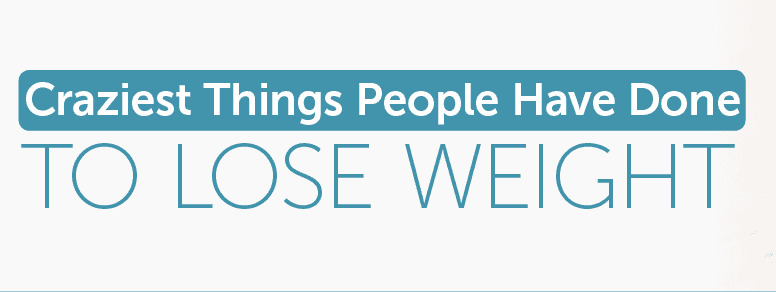Dissecting the Weight Loss Journey: How and Why People are Losing Weight
Note: The following information could be triggering to those with a history of eating disorders or other sensitivities to weight loss. We do not endorse extreme weight loss procedures mentioned in the study.
One quick online search about weight loss will point you to countless different methods, tips, tricks, and general pieces of advice regarding the best way of going about it. Alternatively, people might seek recommendations from family, friends, and professionals in order to get the kind of guidance they’re looking for. Renew Bariatrics in Mexico surveyed 1,012 people to learn more about their weight loss journey and choices in order to achieve their desired results.
What are people’s reasons for cutting weight in the first place? What sources do they consult, and what weight loss methods are they instilling in their daily life? How accurately did they reach their weight loss goal? These questions, and more, will be addressed in the findings. Read on to find out more.
Key Takeaways:
- 37% of people feel more pressured to lose weight now as the world reopens post-COVID than they did before the pandemic.
- When people chose to reduce their calories as a method to lose weight, on average, they cut their calories by 559. While dieting men reported eating 1,238 calories a day, women said they were only eating 1,092.
- 59% of respondents got information about their weight loss method from Facebook, and 53% said they were more likely to try a weight loss trick if it was endorsed by a celebrity.
- While trying to lose weight, 46% reported lower energy levels, 45% reported feeling fatigue, and 36% felt more irritable.
Starting Somewhere
After over a year of isolation, many are eager to lose a couple pounds that they may have put on throughout the pandemic. Thirty-seven percent of our respondents felt more pressure to get in shape than they ever had before, but 17% weren’t sweating it. Millennials felt most inclined to get back in the gym, whereas baby boomers were in no rush.
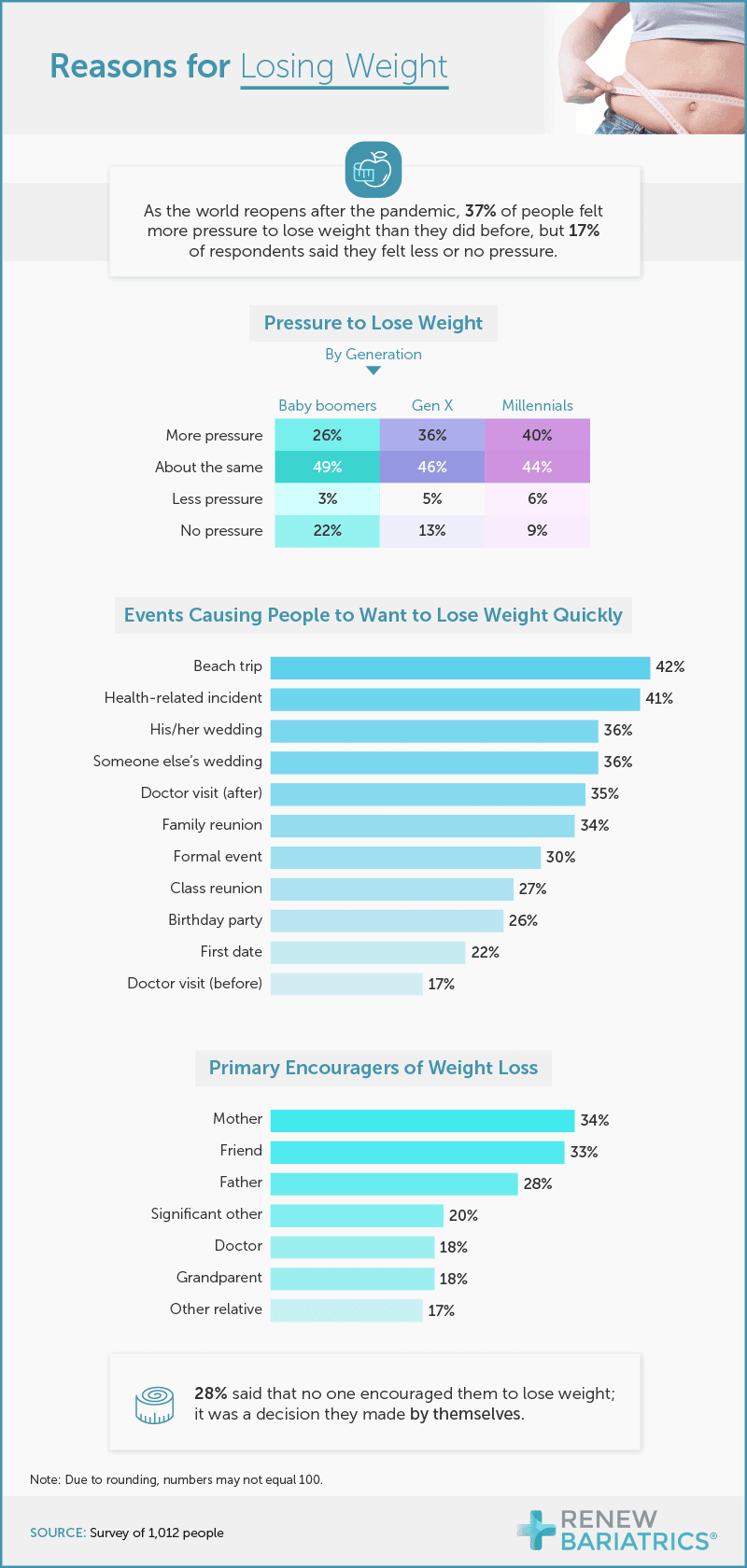
The primary motivation for people to lose weight was to prepare for an upcoming beach trip. For those who want to hit the beach with confidence, starting to work on your summer body in the winter can be a smart thing to do. On a physical level, working out in the cold helps you lose weight faster, and on a mental level, it can help curb the winter blues. Weight loss is also a long-term commitment, so it’s better to get started well in advance of your beach excursion.
Family and friends also played a big role regarding weight loss motivation. Our loved ones naturally always have our backs, but that being said, over a quarter of respondents said that they had no external encouragement to lose weight, and it was their sole decision to challenge themselves to do it.
Consulting the Experts
Getting started in the gym and learning about proper nutrition can be a daunting task without help, which is why respondents consulted a variety of resources to help jump-start their weight loss journeys.
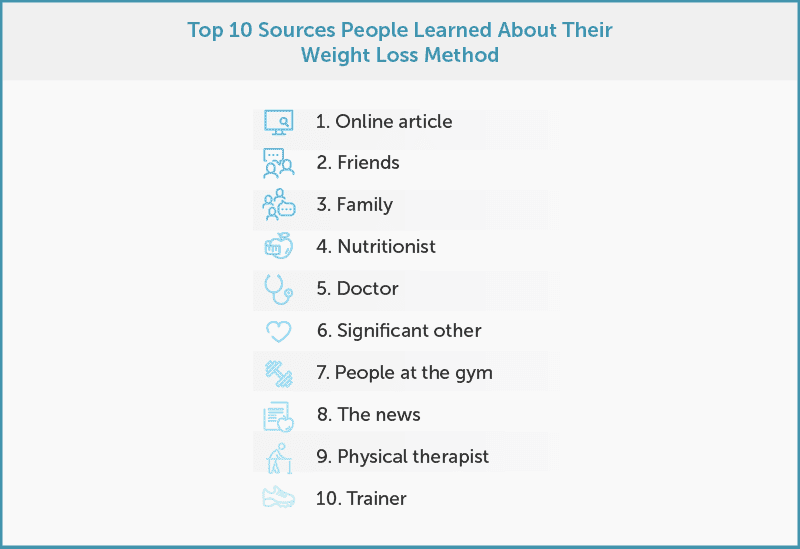
The internet, unsurprisingly, was the go-to place to learn more about weight loss methods. An abundance of online articles can be found pertaining to different tips and tricks as to how to go about getting in shape. Respondents also asked their friends and family for advice, but didn’t hesitate to consult a nutritionist for their professional opinion. The tailored nutritional advice based on your specific needs can be a huge help for people looking for a thorough and detailed plan to tackle weight loss or to generally increase their health and well-being.
Other professionals that could be consulted include doctors, physical therapists, and trainers. Otherwise, people referred to their significant other, people at the gym, and the news for weight loss methods and related advice.
Tips and Tricks
When choosing to restrict calories, respondents cut, on average, 559 calories from their normal daily intake. Men consumed 1,238 per day, and women were just under the 1,100 mark. This strategy involves operating in a caloric deficit, as opposed to a caloric surplus (in which weight gain is the primary goal). Aside from eating less, eating well is just as important – to get the most out of a weight loss or gain program, eating vegetables, fruits, proteins, whole grains, and healthful oils is incredibly helpful to achieve one’s goals.
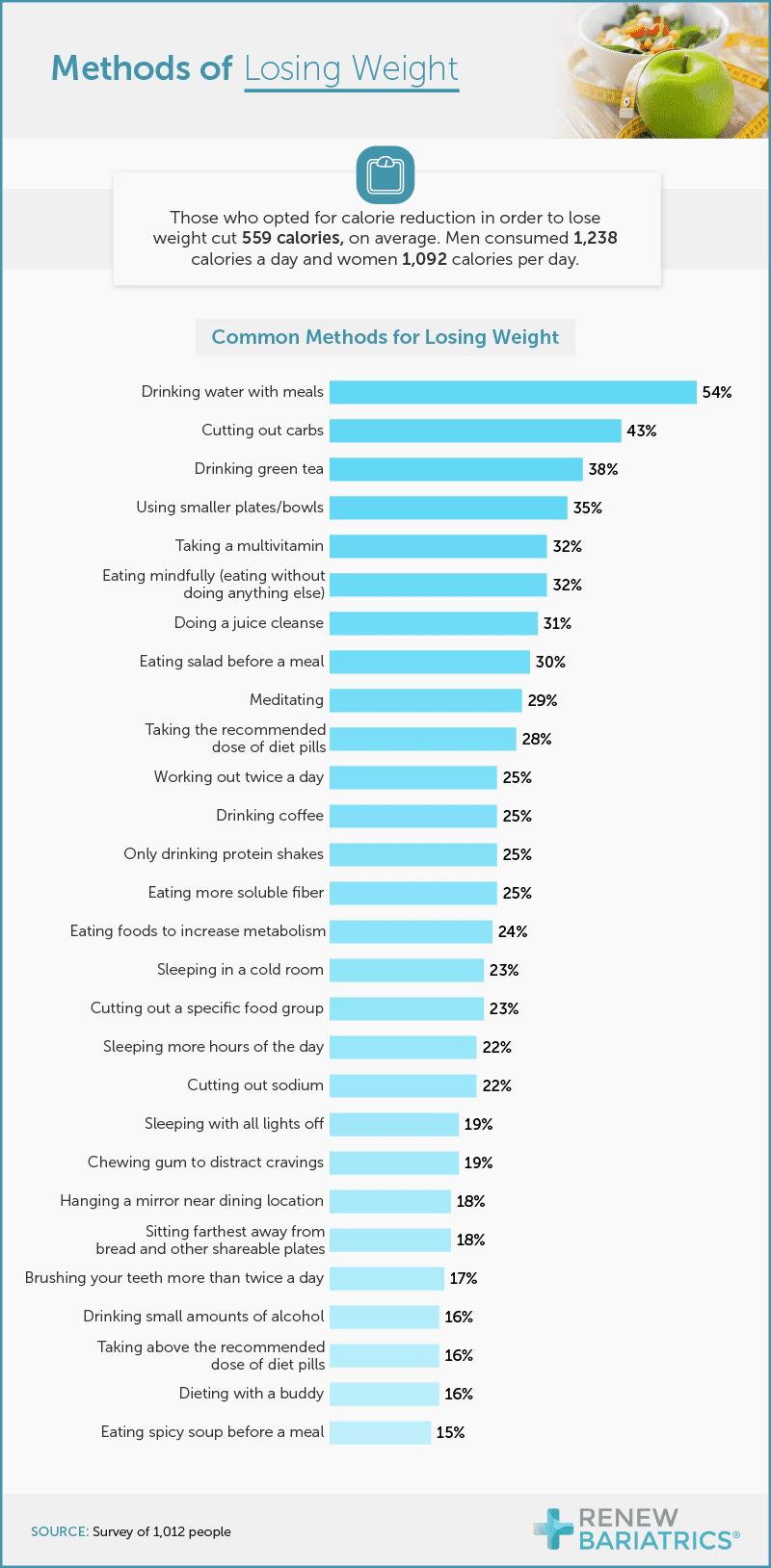
From the survey, over half of respondents tried to drink water at every meal to increase the weight loss process – evidence suggests that the more water you drink, the faster your metabolism functions, burning more calories on a daily basis. This might explain why drinking green tea was also a popular option. Otherwise, other commonly practiced methods included cutting out carbs as a whole and using smaller plates and/or bowls for portion control.
Respondents also considered ways to lose weight that didn’t involve food at all. For example, almost 30% of them practiced meditation, and a quarter made an effort to work out twice a day. Different ways of sleeping were also considered, like doing so in a cold room, with the lights off, and generally getting more hours in. Other sleep-related weight loss tips include keeping a consistent sleep schedule, not eating right before bed, and becoming an early bird.
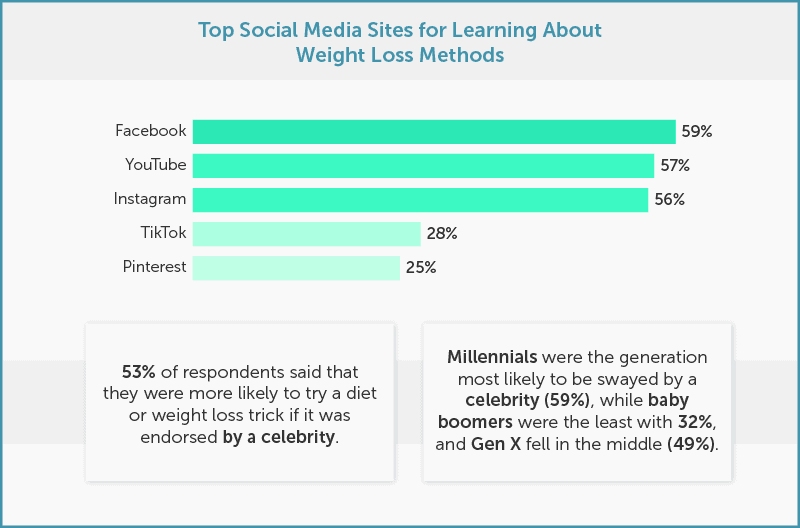
When looking at how people found out about these diets, nearly 60% of respondents checked out Facebook, YouTube, and Instagram for weight loss-related content. If endorsed by a celebrity, over half would be more willing to give that given weight loss method a go, and millennials were the most inclined to do so, compared to other generations.
The Struggle Is Real
After their weight loss journeys, about half of respondents lost as much weight as they originally intended, but a quarter lost more than they expected, and the other quarter lost less. It seems as if men had an easier time shedding their weight, whereas women were less likely to reach their target. Also, in the longer term, men had an easier time maintaining their new, leaner physiques than women did.
The weight loss journey is no easy feat, and even after the weight is lost, there can be repercussions. Regarding physical ones, the most common issue that people dealt with was operating on a slower metabolism. To lessen the blow, dieting slowly can soften the transition versus losing weight at a rapid pace.
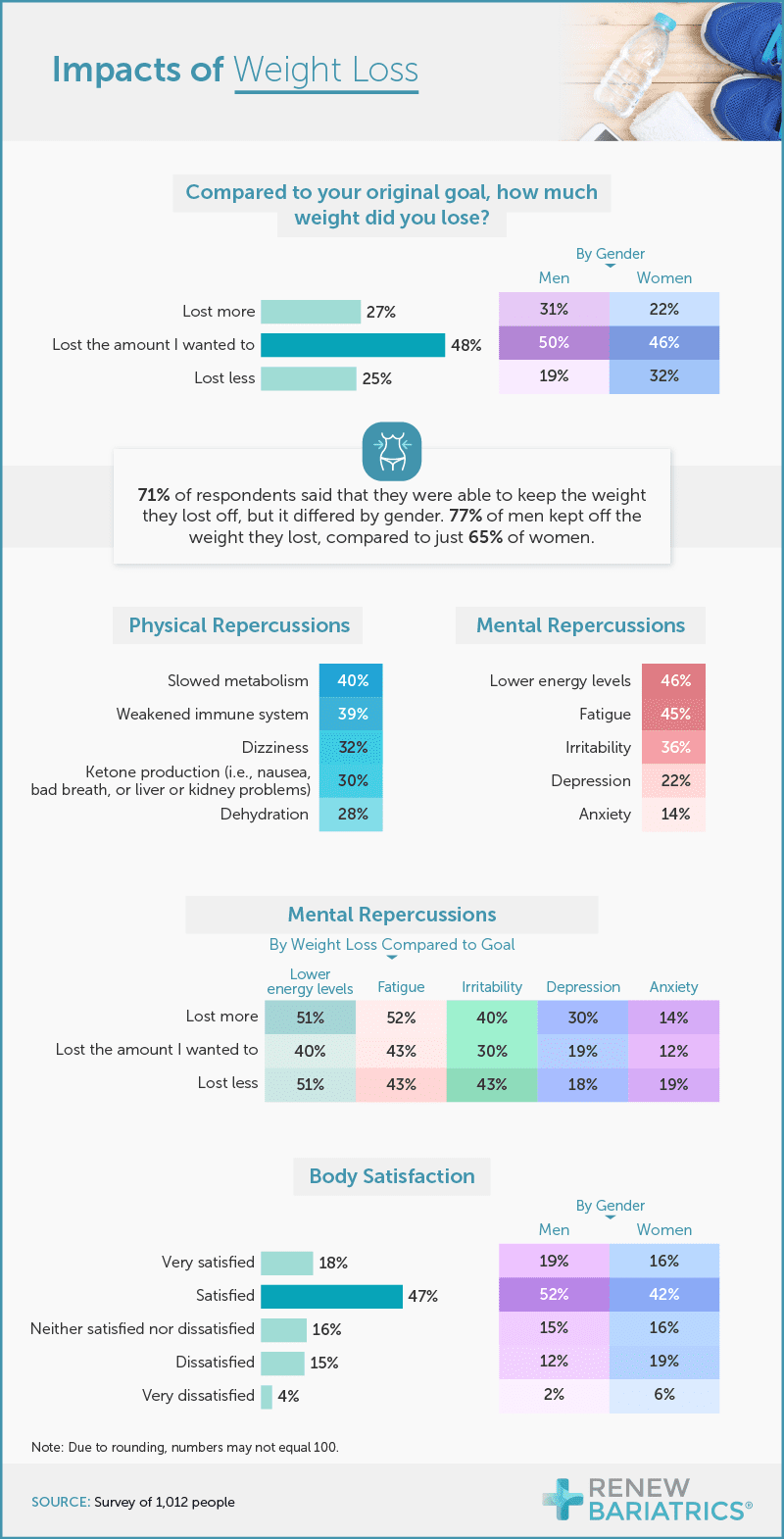
On the mental side of things, lower energy levels and general fatigue were two things that respondents struggled with throughout their cut. Eating less calories and working out more can definitely contribute to a dip in energy levels, especially at the beginning. Also, the loss of comfort foods can be hard for some people to stomach, reducing their motivation to stay committed to their goals, especially if they’ve made the mistake of setting unrealistic ones.
Generally, people who lost the amount of weight they originally set out to lose suffered less mentally than people who endured a bigger or smaller loss than planned.
Also, once their journey concluded, nearly half of respondents were satisfied with their body, men more so than women. Although, some of them weren’t as happy with the results as they might’ve wanted to be.
An Easier Way
While respondents often found success through their weight loss methods, they also reported a number of negative physical and mental repercussions in addition to the sacrifices made during their journey.
At Renew Bariatrics, we provide a simpler and healthier way to meet your weight loss goals with the professional help of health care experts. Our team of experienced medical professionals can get you looking and feeling great for your next beach trip or wedding without the emotional turmoil. And our staff adheres to extensive standards to help ensure that you will have a safe and beneficial surgical experience and trip.
Methodology and Limitations
We collected responses from 1,012 respondents using Amazon Mechanical Turk. Fifty-one percent identified as men, 48% identified as women, and about 1% identified as nonbinary or nonconforming. As for generational breakdowns, 13% were baby boomers, 27% belonged to Generation X, and 57% were millennials. Three percent were part of Generation Z, but due to a small sample size were not included in the generational analysis. With a larger Gen Z sample size, we could perhaps study the effects of social media and celebrities on weight loss attempts more.
Those who failed an attention check were disqualified from the survey. The data we are presenting rely on self-report. There are many issues with self-reported data. These issues include, but are not limited to, the following: selective memory, telescoping, attribution, and exaggeration. No statistical testing was performed, so the claims listed above are based on means alone. As such, this content is purely exploratory, and future research should approach the topic in a more rigorous way.
Fair Use Statement
Know someone who might be interested in learning about different weight loss methods? Feel free to send this article their way! We just ask that you do so for noncommercial use only and to provide a link back to the original page so contributors can earn credit for their work.

